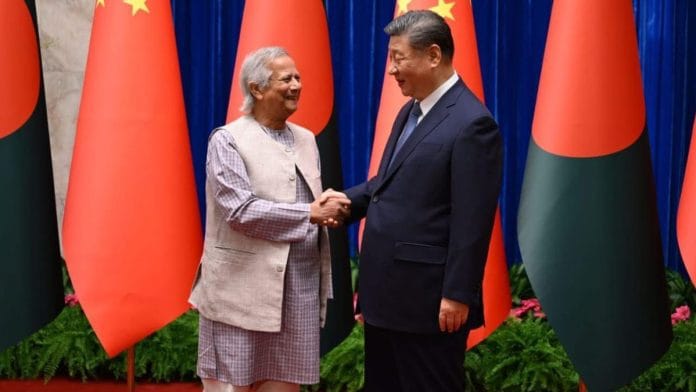New Delhi: China and Bangladesh agreed to negotiate a Free Trade Agreement (FTA) and are officially starting talks on optimising an investment agreement in a bid to increase trade and economic cooperation. This comes amid tensions between India and Bangladesh since the ousting of Sheikh Hasina’s government last year.
The announcements were made in a joint statement after Bangladesh Chief Adviser Mohammad Yunus met Chinese President Xi Jinping in Beijing Friday.
According to the statement, Bangladesh also “firmly supports the one-China principle and opposes” Taiwanese independence. While Dhaka backed the one-China principle under the government of Khaleda Zia in 2005, it had not reaffirmed this under Hasina.
Both sides also discussed developing the Chinese Economic and Industrial Zone (CEIZ) in Chittagong and agreed to promote high-quality Belt and Road (BRI) cooperation and strengthen international cooperation on industrial and supply chains.
Bangladesh also welcomed Chinese involvement in several key infrastructure projects, including the Mongla Port Facilities Modernisation and Expansion Project, which will significantly improve trade and logistics infrastructure.
“China insists on being a good neighbour, good friend and good partner that each other trusts,” Xi said after the meeting.
Yunus, in return, called China “a reliable friend and partner”.
He was on 4-day visit to China, his first bilateral visit since forming the interim government last year. Yunus broke with the long-standing tradition of visiting India first.
The only previous exception was former president Zia ur Rahman, who also made China his first stop. Zia had strengthened Bangladesh’s ties with both the West and China, shifting away from the country’s strong alignment with India.
Ties between India and Bangladesh have remained tense amid a domestic political reset since anti-government protests ousted Hasina in August last year.
However, in a letter to Yunus Wednesday, on the occasion of Bangladesh’s National Day, Prime Minister Narendra Modi said India was “committed to advancing this partnership, driven by our common aspirations for peace, stability, and prosperity, and based on mutual sensitivity to each other’s interests and concerns”.
Reports say Dhaka requested a meeting between Yunus and Modi on the sidelines of the upcoming BIMSTEC Summit in Bangkok, Thailand.
Also Read: 1971 or 2024? A political battle in Bangladesh over when the nation found true liberation
Growing bilateral ties
The statement further said that the Chinese government welcomed the interim government in Bangladesh, led by Yunus, and noted the reform and progress it had made since August 2024.
Bangladesh said it appreciates China’s constructive role in promoting peace talks on Myanmar and in promoting the resolution of issue of the forcible displacement of people from its Rakhine state who have taken shelter in Bangladesh.
Among other agreements, on the environment front, the two countries signed the implementation plan for the Memorandum of Understanding (MoU) on the Exchange of Hydrological Information for the Yarlung Zangbo-Jamuna River.
Bangladesh also welcomed the participation of Chinese companies in the Teesta River Comprehensive Management and Restoration Project (TRCMRP).
With India issuing fewer than normal medical visas, China also saw a rare opportunity to expand its own medical visa offerings. This was reflected in the talks between the two heads. Healthcare cooperation was another highlight, with Bangladesh expressing gratitude for China’s support in providing medical treatment for Bangladeshi patients in Yunnan Province.
Both countries also agreed to strengthen global cooperation, particularly through Xi’s Global Security and Global Civilization Initiatives.
During the visit, both countries signed several agreements in areas such as economic and technical cooperation, cultural heritage, media exchange, sports, and healthcare, further enhancing their bilateral relationship.
In December 2024, months after Yunus took office, Bangladesh’s newly appointed envoy to China, Nazmul Islam, met with Liu Jinsong, director-general of the Asian Affairs Department at China’s Foreign Ministry.
During the meeting, Islam endorsed the idea of celebrating the 50th anniversary of bilateral ties as the “China-Bangladesh Year of People-to-People Exchanges”. People-to-people exchanges with Bangladesh are traditionally dominated by India.
Speaking to media in Dhaka Tuesday, Chinese Ambassador to Bangladesh Yao Wen described Yunus’s visit as “the most important visit by a Bangladeshi leader in 50 years”.
This is the Bangladeshi leader’s highest-level bilateral engagement with a global power to date, though he has interacted with several world leaders, including former US President Joe Biden and President Recep Tayyip Erdoğan of Turkey on the sidelines of global summits or international meetings such as the United Nations General Assembly (UNGA) in 2024.
In a separate development, China announced that it will extend duty-free and quota-free access to Bangladeshi goods until 2028. This decision comes as Bangladesh prepares to transition from a Least Developed Country to a middle-income economy in 2026. This was announced Thursday by Chinese Vice Premier Ding Xuexiang.
(Edited by Sanya Mathur)
Also Read: Amid trade war with US, China’s Exim Bank backs relocation of Chinese manufacturing to Bangladesh






